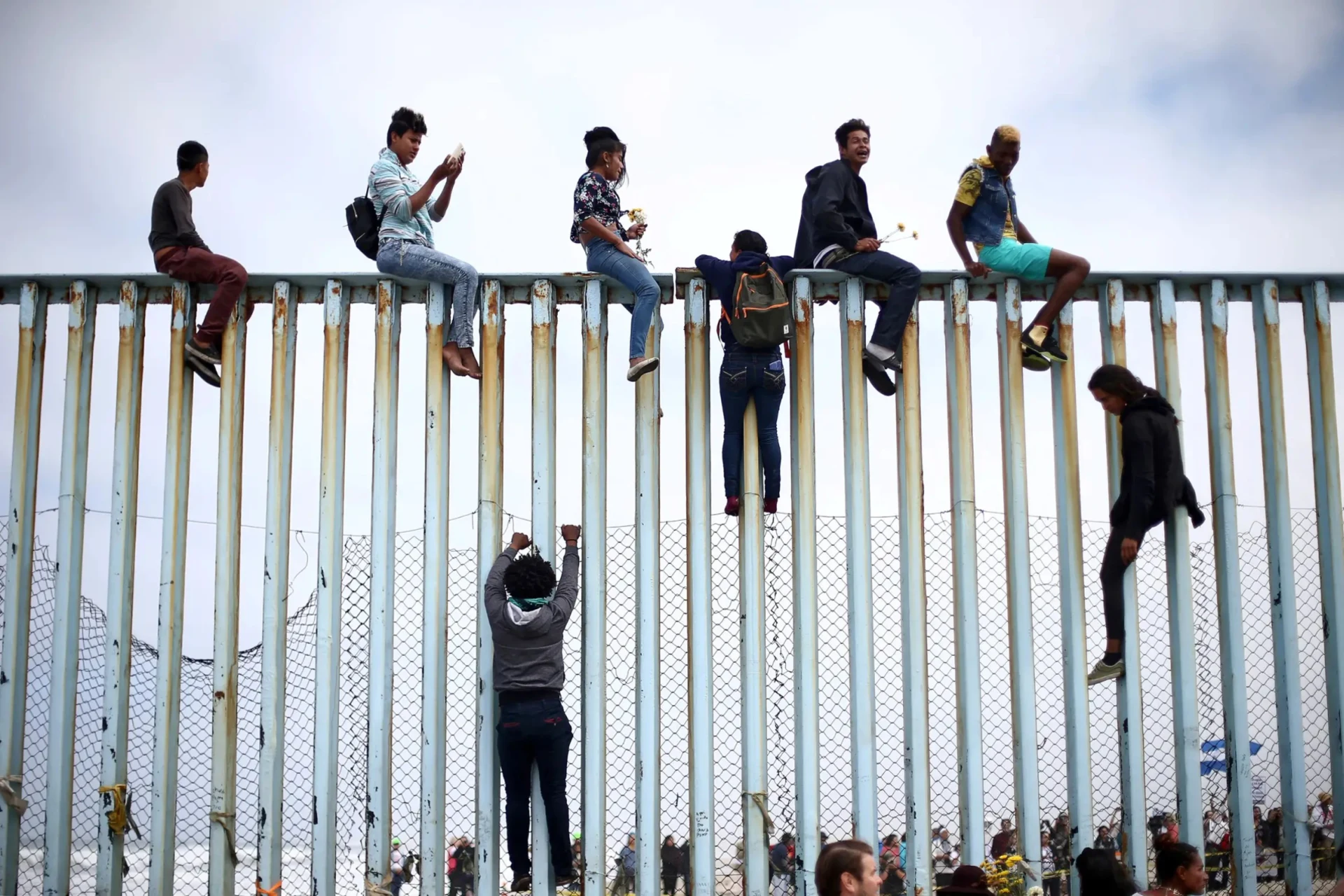Tough New Immigration Rules Risk Empowering the Cartels
Tight restrictions on asylum and parole will drive migration further underground, where criminal groups profit.
Originally published at TIME magazine

For Biden and the Democrats, everything—the president’s foreign policy agenda, the prospect of a government shutdown, even holding onto the White House—seems to be riding on negotiations around border and asylum policy, spurred on by the unprecedented numbers of migrants and asylum arriving at the U.S.-Mexico border.
Although immigration hawks have made noise about a border crisis for years, it’s undeniable that in the wake of the COVID-19 pandemic, irregular migration—primarily from crisis-stricken countries in Latin America and the Caribbean—has reached unprecedented, unmanageable proportions: in December, U.S. officials processed 300,000 migrants at the U.S. southern border—the largest number ever for a single month. Border officials encountered over 2.5 million people in 2023—a growing share of whom have ended up in cities like New York and Chicago, straining city budgets and prompting Democratic mayors and governors to demand more help from the Biden Administration.
Given the scarcity of legal pathways to immigrate to the U.S., hundreds of thousands of people—the vast majority fleeing economic crises and authoritarian governments in Latin America and the Caribbean—are pursuing the only legal option open to them: seeking asylum. But the asylum system is broken. Overburdened, underfunded courts routinely take years to decide on asylum cases and are unlikely to approve many cases currently contributing to the backlog. Latin American migrants flee life-threatening conditions—like extreme poverty, hunger, gang violence, and in some cases, corrupt authoritarian governments—but most of those arriving at the border do not face persecution on the basis of race, religion, nationality, political opinion, or membership in a particular social group: core criteria for receiving asylum.
In response to the dysfunction, Republicans in Congress are instead pressing a hard bargain, demanding Biden and Democrats enact the GOP’s vision of restrictive new border controls to a tee without expanding legal pathways. To dial up the pressure, they are blocking Biden’s proposed $105 billion package to aid Ukraine, Israel, and Taiwan, and to fund existing border security measures. Despite weeks of negotiations by a bipartisan group of Senators, several House Republicans said in early January that they will accept nothing less than the measures laid out in a hardline immigration bill, known as HR 2, that passed Congress without a single Democrat vote in support last year.
The White House is likely prepared to meet several of the toughest demands, according to CBS immigration reporter Camilo Montoya-Galvez. These likely include creating a new policy similar to Title 42—the pandemic-era, Trump administration policy that allowed border patrol to quickly expel migrants to Mexico without allowing them to petition for asylum in the United States—raising the bar in asylum interviews and expanding expedited detention and removals. Republicans are also demanding restrictions on parole: an authority that allows presidents to admit migrants facing humanitarian crisis into the country on an emergency basis, which Biden has paroled refugees fleeing Afghanistan, Ukraine, and Venezuela, and other countries. And although the White House initially ruled out changes to parole, Montoya-Galvez reports that parole is now likely on the chopping block, too.
For Biden and the Democrats, the reasons for considering such drastic changes to border and immigration policy are clear. Domestically, failure to reach a deal could bring a partial government shutdown as early as January 19 and a full-blown one on February 2—although House and Senate leaders just agreed to a funding deal that reduces the likelihood of that happening. Perceptions of chaos might be the biggest threat to Biden’s reelection bid. Polls show a November rematch between Biden and his likely competitor, Donald Trump, would be a close race anyway, and no issue weighs down Biden like immigration and the border. The GOP now holds an 18-point lead over Democrats among voters on handling of immigration. Internationally, failure to pass the aid package would imperil Ukraine’s ability to mount counterattacks and hold its front line.
But as the impasse drags on and pressure mounts, it’s worth stating an inconvenient fact that many Republicans and some Democrats would prefer to ignore: migration across the Western Hemisphere has surged not because U.S. immigration or border policies or their enforcement has weakened, but because a series of crises have destabilized Latin America and the Caribbean, and an underground economy has emerged to facilitate the movement of hundreds of thousands of people north. Even the toughest new border policies—the sort Republicans envision—won’t address those issues. What such policies will do is strengthen incentives for migrants to attempt border crossings between legal ports—where border officials have a harder time making apprehensions—and to drive up demand for the services of human smugglers. Hardline border policies of the type now envisioned would make the border more lawless, not less.
The argument for strict new border rules rests on the assumption that tougher measures will deter Latin American migrants from coming to the border in the first place. But Trump tried that approach, and it failed. True, his administration decreased overall immigration numbers drastically, but it did so by taking an axe to legal migration, which it decreased by 63 percent. Meanwhile, it failed entirely to reduce irregular migration. Take Title 42—the pandemic-era policy that allowed border patrol to quickly expel migrants to Mexico without allowing them to petition for asylum in the U.S. If you believe in deterrence, Title 42 should have sent the number of migrants arriving to the U.S.-Mexico border plummeting. Instead, shortly after Title 42 went in effect, migrant arrivals surged past all previous records. Even among nationalities subject to immediate expulsion to Mexico—like Cubans, Venezuelans, and Guatemalans—the policy barely reduced numbers. “Tough” border policies simply drove migration further underground: illegal crossings, repeat attempts at crossings, and evasion of border patrol increased as migrants sought to avoid detection. By contrast, since Title 42 ended in May 2023, the number of illegal covert crossings has fallen by half.
Not many lawmakers like to admit it, but migration surges correspond much more to crises roiling Latin America and the Caribbean than they do to new immigration policies ironed out in D.C. Economic collapse and authoritarian repression have pushed seven million Venezuelans and over one million Cubans to leave their countries. Hundreds of thousands of Haitians, Ecuadoreans, and Central Americans have fled poverty and gang violence. For years, more politically stable Latin American countries like Colombia, Brazil, and Chile absorbed the bulk of these flows, becoming home to over 80 percent of these fleeing Venezuelans and millions of Haitians. The pandemic’s steep toll on the region’s economies, global price hikes, and a decade of slow economic growth have driven many migrants to uproot once again and head for the U.S., where nearly 9 million job vacancies and safer conditions offer hope. As former top White House Latin America advisor Dan Restrepo has argued, Washington can do more to help stabilize the region’s economies and host communities—for instance, by leveraging development finance tools—without hopelessly trying to “fix” crises in Venezuela, Nicaragua, Cuba, or Haiti. But debate in Congress is focused on the border—and not an inch beyond it.
If Democrats and Republicans arrive at a “deal” that gives border hawks everything they want, not everyone will lose out—Latin America’s human smugglers and criminal groups, especially those active in northern Mexico, will find themselves suddenly in an even more advantageous situation. Over the past decade, as more and more people have set their sights on heading north, supply has met demand: a physical and digital infrastructure has sprung up, stretching from Venezuela and Ecuador to northern Mexico, that facilitates the grueling overland journey from South America to North—squeezing migrants for every penny and racking up huge profits for guides, human smugglers, and corrupt state officials along the way. The Darién Gap—a once all-but impassible stretch of mountainous jungle between Panama and Colombia which 500,000 migrants are believed to have crossed in 2023—is now crisscrossed by rough-hewn dirt roads, “security checkpoints” run by armed groups, and stores selling provisions. WhatsApp groups and TikTok accounts—the digital side of the hemisphere’s new migration infrastructure—advertise information about routes and services, giving more people in the Americas more information about how to migrate than ever before. These channels of communication give no accurate estimates of the odds of successfully making it to the U.S. or remaining there. But they suggest making it is possible. Often, that’s enough to inspire desperate people to begin their journeys.
Organized crime is not the only actor benefiting from the new migration economy. Small informal businesses and loosely connected individuals often sell migrants services. But criminal groups just as frequently de facto control the border zones—from Ecuador to Mexico—in which these businesses operate, extorting their proprietors and migrants, alike. InSight Crime, an organization that researches cartels in Latin America, has shown that Mexican drug cartels have taken over operations along the U.S.-Mexico border—in part as a result of U.S. policies such as the now defunct “remain in Mexico” which created pools of desperate migrants these criminal groups could extort and exploit. If new hardline measures are enacted, expect these Mexican cartels—some of the same ones that traffic deadly fentanyl into the U.S.—to turn eye-popping profits.
With Ukraine funding and possibly Biden’s reelection on the line, Democrats could end up a radical overhaul of border policy as a necessary sacrifice. But no one should expect tougher rules at the border to end the surge in irregular migration. Even more urgently than a decade ago, when it was last seriously up for discussion, the U.S. needs comprehensive, bipartisan immigration reform. It has been done before. In 1986, a Republican president—Ronald Reagan—signed into law the Immigration Reform and Control Act, amnestying undocumented people, expanding guest worker programs, securing the border, and enhancing requirements for employers. Only reform on a similarly ambitious scale will provide lasting means of dealing with the unprecedented situation the Americas face now.
*This article originally appeared on TIME magazine and has been republished here in full with permission. Click here to read the original post.*
